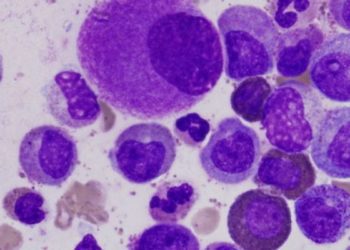APOL1 variants linked to increased risk of renal disease among black patients
Image: CC/Wiki
1. Patients with the high risk variant of APOL1 are at an increased risk of decline in kidney function.
2. The high risk variants of APOL1 are more common in black patients and confer increased risk of kidney disease, regardless of diabetes status.
Evidence Rating Level: 2 (Good)
Study Rundown: Black patients have an increased risk of end stage renal disease (ESRD) compared to white patients and progress more quickly once they develop chronic kidney disease (CKD). Prior studies suggest that variants of the gene, apolipoprotein L1 (APOL1) may play a role in the development of several types of kidney disease. Variants G1 and G2 of APOL1 are common in populations of African descent. These variants confer resistance to Typanosoma brucei infections, but are also believed to account for the increased risk of renal disease among black patients. The data from two studies examined here demonstrate a strong link between APOL1 status and progression of renal disease. In both studies, APOL1 risk variants conferred an increased risk of development of ESRD and a greater rate of decline in renal function. These studies had a long duration of follow up and low rates of missing outcome data; however, some patients from the African American Study of Kidney Disease and Hypertension (AASK) were not successfully genotyped, potentially biasing the study. Additionally, the physiologic role of APOL1 in the kidney is unknown and it is possible that the observed clinical changes may in fact be due to another related gene, and not to APOL1 itself. Lastly, even the compelling differences within this study are insufficient to explain the markedly increased risk of kidney disease among blacks compared to whites.
Click to read the study, published today in NEJM
Relevant Reading: Apolipoprotein L1 gene variants associate with hypertension-attributed nephropathy and the rate of kidney function decline in African Americans
Study author, Dr. Lawrence J. Appel, MD, MPH, talks to 2 Minute Medicine: Welch Center for Prevention, Epidemiology, and Clinical Research, Johns Hopkins Medical Institutions
“Our findings highlight the importance of the gene APOL1 in explaining why blacks have faster kidney disease progression than whites. In two NIDDK-funded prospective studies, blacks with chronic kidney disease and the high-risk genetic variants were more likely to have kidney disease that progressed compared to both blacks without the high-risk genotype and whites. Findings were similar in patients with and without diabetes.”
In-Depth [prospective cohort study]: The authors compiled data from two cohort-based studies: AASK and the Chronic Renal Insufficiency Cohort (CRIC) study. In the AASK study, patients who self-identified as black and had CKD were genotyped to determine APOL1 status. Patients were followed for an average of 9 years with the composite endpoint consisting of a doubling of baseline serum creatinine or development of ESRD. Of these patients 42% reached the composite renal outcome. Patients with 2 copies of the APOL1 risk variants were twice as likely to progress to primary endpoint (HR, 2.03; P<0.001), while patients with only 1 copy of the APOL1 risk variant had similar risk to patients with none. The CRIC study genotyped both black and white patients and followed them for an average of 4.4 years. The primary outcomes were the rate of decline in kidney function over time and the composite of ESRD or reduction in glomerular filtration rate (GFR) of at least 50%. After adjusting for demographic, socioeconomic, and clinical risk factors, the authors determined that the rate of GFR reduction was greater in patients with APOL1 risk variants. Additionally, patients with APOL1 risk variants had a higher risk of the composite renal outcome, regardless of diabetes status. The hazard ratio for non-diabetic blacks with high risk APOL1 variants compared to whites was 2.68 (P<0.001).
By Akira Shishido, MD and Adrienne Cheung
More from this author: Pneumocystis linked to sudden infant deaths, Continuous infusion of beta-lactams may be superior to bolus therapy, Novel antiviral drug reduces influenza viral load, Three months of antibiotics appear to effectively treat early-onset spinal implant infections
©2012-2013 2minutemedicine.com. All rights reserved. No works may be reproduced without expressed written consent from 2minutemedicine.com. Disclaimer: We present factual information directly from peer reviewed medical journals. No post should be construed as medical advice and is not intended as such by the authors, editors, staff or by 2minutemedicine.com. PLEASE SEE A HEALTHCARE PROVIDER IN YOUR AREA IF YOU SEEK MEDICAL ADVICE OF ANY SORT.









